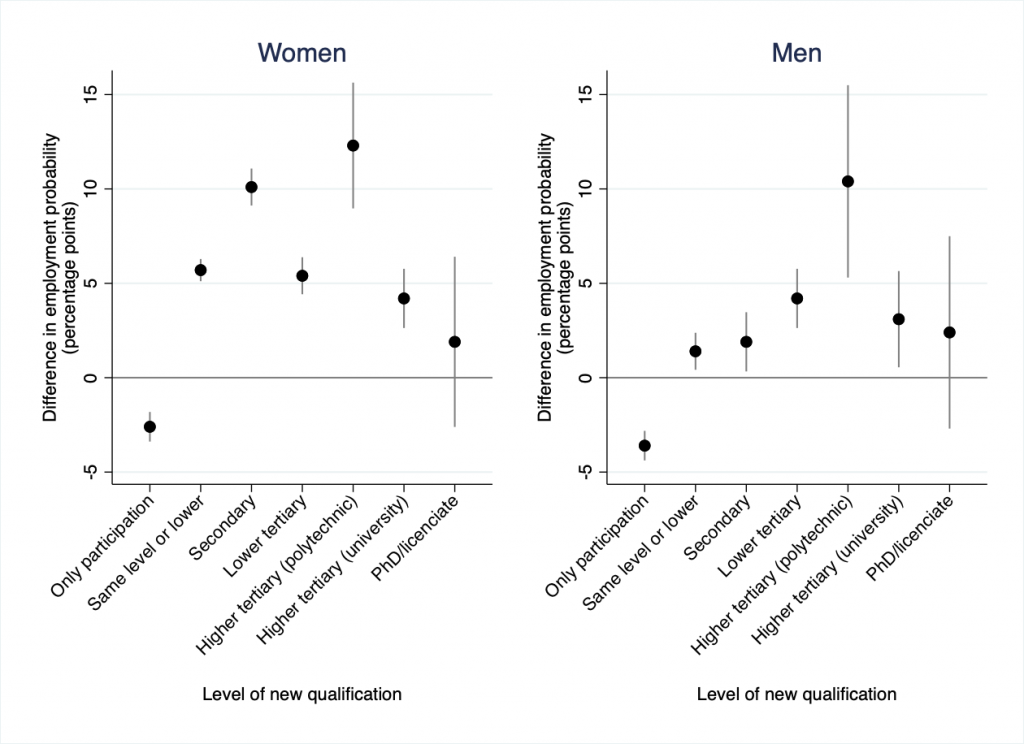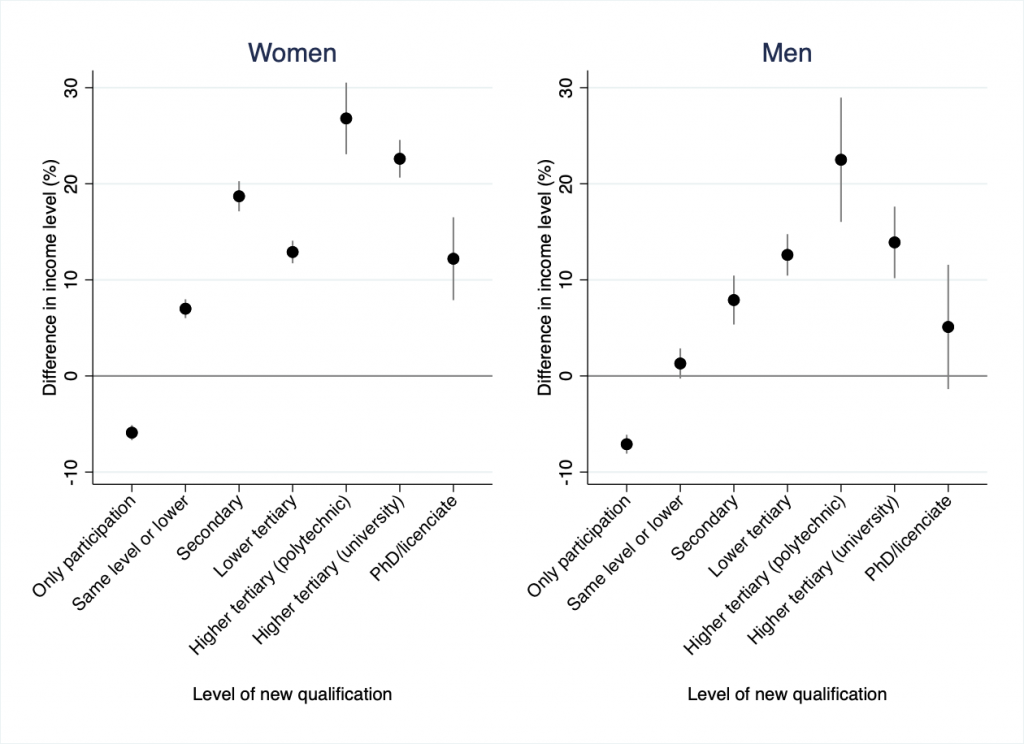Elina Kilpi-Jakonen & Outi Sirniö
INVEST Blog 10/2020
To what extent do individuals benefit from returning to formal education at a later age? To answer this question we have employed full-population register data and a long-term perspective of labour market outcomes both before and after educational enrolment among adult learners and similar long-term measures among individuals who did not return to education. We find clear positive benefits from new educational qualifications, particularly when the new qualifications are at a higher level than the previously held ones. However, merely enrolling in education without completing a qualification is even associated with lower labour market outcomes than not returning to education at all.
The Finnish educational system is relatively open at all levels and it is always possible to continue one’s studies. Institutions of higher education are open to applicants who do not possess the formal full upper secondary certificates – even if entry through these pathways is restricted to quite small numbers. Indeed, a large number of Finnish adults take part in education throughout their working lives. In 2018, 9 percent of Finns aged 30–65 were enrolled in an educational programme leading to a qualification; this proportion has been rising steadily since at least 2004 (Statistics Finland 2020).
But how much do individuals gain from participation in education at a later age and their newly acquired qualifications?
This study
We used Finnish register data to examine how formal education started after the age of 25 is associated with income development and employment probabilities. We followed the incomes and employment trajectories of individuals born in 1951–76 from the year 1995 until 2015. We defined adult learners as those individuals who enrolled in 2001 and 2002 and who had not been enrolled in 1999 and 2000. These adult learners were aged 25–50 when they began their studies. For labour market outcomes we focused on the years 2012–15 in order to capture the long-term effects of adult education.
In order to establish the benefits of adult education, we compared the new qualifications obtained by these adult learners, as well as enrolment which did not lead to a new qualification, with not taking part in adult education at all between 2001–15. In our statistical analyses, we control for both demographic characteristics as well as education level in 2000. In order to account for some of the selection based on labour market success we also control for income levels and employment in the late 1990s.
Completing a new qualification pays off
Our results show that a new polytechnic Master’s degree was associated with the greatest benefits. It increased the probability of being employed by approximately 11 percentage points and income levels by approximately 24 percent in comparison with not enrolling in education. Overall, all new qualifications were associated with positive benefits in terms of employment and income with the smallest benefits coming from a new qualification that was at the same or lower level as that held in 2000.
In contrast, enrolling in education but not completing a qualification during the follow-up was associated with lower employment probabilities and incomes in comparison with not enrolling at all. Accordingly, enrollment without graduation indicates a weaker labor market status.

NB. The vertical lines represent 95% confidence intervals. The horizontal line (at 0) is the reference for those who did not start their studies at mature age.
Gender differences larger than differences between age groups
The relative benefits of new qualifications were found to be greater among women than among men. One possible explanation could be differentiation in educational fields, as they are highly gender-segregated in Finland. Formal qualifications are valued in the public sector in which women are employed relatively often. Also, for women adult learning may be related to returning to the labour market after a break for child bearing.
We did not find systematic differences between age groups in terms of the benefits from new qualifications. Despite notable changes in the labour market due to changing industrial structures and technologies, adult education seems to be equally beneficial for younger and older cohorts.
Promoting equal access and the opportunity to complete qualifications for mature students
In conclusion, new qualifications obtained at a mature age are beneficial from an individual point of view. New educational qualifications are associated with increased income levels and the probability of being employed among both genders and in all age groups. Promoting lifelong learning and encouraging mature students to finish their qualifications should thus be a societal goal.
Education is intended to increase skills that are also valuable on the labour market. However, it is sometimes argued that it is the more highly able individuals who are more likely to participate in education and it is their ability, rather than the skills obtained in education, which is rewarded on the labour market. In addition, even free-of-charge education can be costly in terms of opportunity costs: time taken for studies is time that cannot be spent in employment. It would thus be important to investigate whether opportunities to participate in education at a later age are distributed equally.

NB. The vertical lines represent 95% confidence intervals. The horizontal line (at 0) is the reference for those who did not start their studies at mature age.
Original publication
Kilpi-Jakonen E., Sirniö O. (2020) Formal adult education and labour market inequalities in Finland. In: Schrader J., Ioannidou A., Blossfeld HP. (eds) Monetäre und nicht monetäre Erträge von Weiterbildung / Monetary and non-monetary effects of adult education and training. Edition ZfE, vol 7. Springer VS, Wiesbaden. https://doi.org/10.1007/978-3-658-25513-8_4
Author biographies
Elina Kilpi-Jakonen (DPhil) works as an assistant professor of Sociology and Academy Research Fellow in the INVEST Flagship Research Center and the Unit of Sociology, University of Turku.
Outi Sirniö (DSocSci) works as a senior researcher at Finnish Institute for Health and Welfare (THL)in the INVEST Flagship Research Center.
Reference
Statistics Finland. 2020. StatFin database table 11c5 — Population and students and qualifications in post-comprehensive education leading to a qualification by type of education and age, 2004-2018





